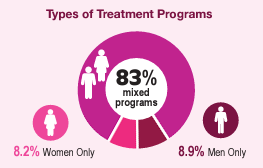

The Power of Collaboration is a joint project between ISSUP and the GWN.
The second issue of Addictology 2024 features seven insightful articles that explore a wide range of topics related to substance use and its broader implications.
One of the key highlights of this issue is the presentation of the results from The Power of Collaboration (POC), a joint project between ISSUP and the GWN. This initiative focuses on three critical areas in the treatment of substance use disorders (SUD) among women. The first area examines global barriers to access for SUD treatment for women, revealing that women, particularly in rural or underserved regions, often face significant challenges in obtaining the care they need. The second area highlights the urgent need for trauma-informed care in SUD treatment, as many women with substance use disorders are also survivors of trauma, yet current treatment programs often lack specialized care to address this. Finally, the third area explores the digital presence of treatment centres worldwide, showing that many centres are not visible online, which limits the ability of women to access essential services.
These findings emphasize the critical need to improve accessibility, trauma care, and digital resources in the treatment of SUD for women.

The Power of Collaboration is a joint project between ISSUP and the GWN.